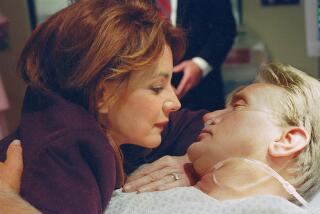Keating S&L; Backed Pope Screenplay : Thrifts: He used more than $100,000 from parent of Irvine-based Lincoln to support a movie about an alleged Soviet plot to assassinate the pontiff.
- Share via
Had things worked out differently, Charles H. Keating Jr. might have become a movie mogul instead of a symbol of the disastrous excesses in the savings and loan industry.
Keating, former chairman of American Continental Corp., spent more than $100,000 of his company’s money in 1987 for a screenplay about a Soviet plot to assassinate the Pope at Fatima, Portugal, according to court records and interviews.
The effort by Keating was aborted later as he was coming under increasing pressure from federal thrift regulators over the risky ventures and shaky financial condition of the company’s main unit, Lincoln Savings & Loan in Irvine.
Keating was also prepared to spend $20 million to produce the movie, titled “The Third Secret,” though the money’s source was unclear, according to the Associated Press.
“I found his purpose to be noble: He wanted to save the world,” said Robert Fiveson, an award-winning documentary filmmaker who wrote the script. He said Keating’s only desire was to spread the word of Catholicism to as wide an audience as possible.
Keating’s attorney, Stephen C. Neal, would not let the 67-year-old businessman talk about the movie project while his criminal securities fraud trial is pending in Los Angeles County Superior Court.
“This was a modest expenditure to see if a profitable motion picture could be produced,” Neal said. “After the screenplay was done, a decision was made that it wasn’t viable the way they wanted to do it. There wasn’t enough comfort that it was going to be a success financially.”
Neal said all expenses were “reported and accounted for.”
He said Keating had a “significant background in the entertainment area” through his work at American Financial Corp. in Cincinnati.
AFC, headed by financier Carl Lindner, owned National General Corp. in Los Angeles, which counted Grauman’s Chinese Theater among its chain of movie houses. National General was sold to Mann Theater Corp. of California in 1973 for $67.5 million.
A devout Roman Catholic who contributed $1 million in company money to Mother Teresa’s missionary efforts, Keating had long wanted to help produce religious movies, family members said.
Keating’s daughter, Maureen Mulhern, was involved in “The Third Secret” project, originally entitled “Fatima.” American Continental paid the expenses for her, her husband, Fiveson and Phoenix producer Hamilton Wright Jr. to visit Portugal for a week during the annual pilgrimage, Fiveson said.
Fiveson turned in a script that mixed historical information, such as the attempted assassination of Pope John Paul II by a Turkish terrorist and a bid a year later by a crazed priest brandishing a bayonet, with his fictional account of a KGB agent blackmailed into duty to finish off what the terrorist failed to do.
The final scene, he said, took place in Fatima at the anniversary of the 1917 reported appearance of the Virgin Mary to three children. As the gunman was preparing to shoot, an apparition of an old woman blinded him momentarily.
The plot may sound strange, Fiveson said, but it would have been better than much of what he said he sees on TV. It would also have communicated the message that Keating wanted the world to hear about Catholicism and salvation, he said.
Reached by Associated Press, Wright, whose company was hired by American Continental to produce the movie, said that Keating “wanted to (spread) the message . . . of personal redemption.”
Keating had talked with other screenwriters, including veteran Alfred Levitt, before reaching an agreement with Fiveson.
Levitt told AP that Keating had been inspired to make the film after reading an article in Reader’s Digest about a possible link between the Soviet Union and the May 13, 1981, shooting of the Pope by terrorist Mehmet Ali Agca.
Levitt passed on the idea, but Fiveson was intrigued, especially because the shooting of the Pope occurred on the anniversary--and almost at the same hour--of one of the reported apparitions at Fatima.
Three Portuguese children said that they saw the Virgin Mary in Fatima in 1917 and that she imparted three secrets to them during six apparitions. Two of those secrets were made public. Part of the story of Fatima holds that the third message was withheld by the Vatican.
A year after he was shot, the Pope visited Fatima during the annual pilgrimage to thank the Virgin Mary for saving his life--and was attacked by a Spanish priest who lunged at him with a bayonet. The pontiff was not injured.
Fiveson, who now heads a film production company working for the Air Force, was also impressed by Keating’s intentions.
“Keating did not care if the film made money,” he said. “I got the impression it was an obligation that he was paying back for the blessings that he experienced in his life.” For regulators, who did not know about the expense at the time, the incident simply was “another example of Keating using the institution as a private piggy bank,” said William K. Black, senior deputy chief counsel for the Office of Thrift Supervision in San Francisco.
More to Read
The biggest entertainment stories
Get our big stories about Hollywood, film, television, music, arts, culture and more right in your inbox as soon as they publish.
You may occasionally receive promotional content from the Los Angeles Times.










